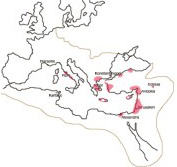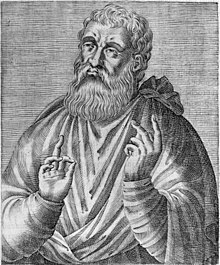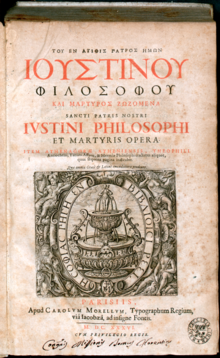Justin the Martyr
Justin , called the martyr , also the philosopher ( ancient Greek Ἰουστῖνος ὁ Μάρτυρ Iustínos ho Mártyr , Latin Iustinus Martyr ; * around 100 in the province of Palestine ; † 165 in Rome ), was a Christian martyr and church father and philosopher .

Justin was a 2nd century Doctor of the Church who is ranked among the Apologists . His view is influenced by Platonism and is considered to be the beginning of the adaptation of Greek philosophy in Christianity (although the Gospel of John, which is based on the Logos idea, points in this direction). In search of the truth, he became familiar with several philosophical directions ( Stoics , Peripatetics and Pythagoreans ). As a Platonist, he pondered the question of God and became aware of the prophets. So he finally converted to Christianity, the "only reliable and useful philosophy".
Live and act
Justin, the son of a Priscus is called and grandson of a Baccheios, a musician, was probably in Machusa at Shechem in Palestine born (that after its destruction by Vespasian then Flavia Neapolis was said today Arabized Nablus ) and grew up in more affluent circumstances . In his apology he introduced himself as Justinos, son of Priscus, son of Bacheios, from Flavia Neapolis, in Syria Galilee . He came from a pagan family and was interested in philosophy from an early age. In Nablus he went to the school of a stoic, a peripatetic and finally a platonic. Later he turned to Christianity , possibly in Ephesus , settled in Rome and founded a school of philosophy there. In Rome he got into a dispute with the Cynical philosopher Crescens and was reportedly reported by him or one of his followers because of his teachings. According to other sources, Justin was said to have been betrayed by one of his own students.
Justin was arrested with six other Christians during the reign of the emperor Marc Aurel , in the following process as their spokesman and finally sentenced and executed.
Only three of his many writings have survived. On the one hand, the dialogue with the Jew Tryphon has been preserved, which in the form of the Platonic dialogues reproduces the search of the former pagan and is an important testimony to the early Christian conflict with Judaism ; On the other hand two (as perhaps the dialogue ) to Antoninus Pius directed apologies , in part, forensically -sounding, but persistent in tone and content of rhetoric looking to defend against their opponents as well as the usual prejudices the cause of Christianity.
In addition to the inclusion of philosophy in Christianity, Justin is also associated with the interpretation of the biblical scriptures , especially the Old Testament . In Justin the clear option of the early Church manifests itself for a philosophy purified from the pagan myths and cults of gods as well as from the cultural customs of the time in order to give priority to the truth of being. In this optics, philosophy represents a preferred place of encounter between paganism, Judaism and Christianity and also the introduction to Jesus Christ . Justin is said to have carried out the scriptural evidence up to the extensive collection of references and their cataloging. The emerging interest thereon would also the end of an imminent end of the early Christian express community and the beginning of "Verkirchlichung". A theological doctrine or dogmatics in the narrower sense is not handed down from Justin.
The Catholic Church venerates Justin as a saint and patron of philosophers. His (Protestant, Anglican, Roman Catholic, Orthodox and Armenian) memorial day is June 1st .
Works
- Cohortatio ad Graecos ; Λόγος παραινέτικος πρὸς Ἕλληνας
- Apologia prima pro Christianis ad Antoninum pium ; Απολογία Πρώτη Υπέρ Χριστιανών προς Αντωνίνον τον Ευσεβή addressed to Antoninus Pius and the Roman Senate
- Apologia secunda pro Christianis Απολογία ὑπὲρ Χριστιανῶν πρὸς 'Αvτωνῖνον τὸν Εὐσεβῆ addresses Αντωνίνος ο Ευσεβής (= Antoninus Pius) and the Roman Senate
- Dialogus cum Tryphone Judaeo ; Τοῦ ἁγίου Ἰουστίνου πρὸς Τρύφωνα Ἰουδαῖον Διάλογος.
literature
- Hans Freiherr von Campenhausen : Greek church fathers (= Urban pocket books. Vol. 14). 8th edition. Kohlhammer, Stuttgart a. a. 1993, ISBN 3-17-012887-6 , pp. 14-23.
- Helmut Echternach : Church Fathers, Heretics and Councils. Vandenhoeck & Ruprecht, Göttingen 1962, pp. 82-93.
- Johannes Geffcken : Two Greek apologists. Teubner, Leipzig a. a. 1907 (Reprographic reprint. Olms, Hildesheim et al. 1970).
- Erwin R. Goodenough: The Theology of Justin Martyr. Frommann, Jena 1923.
- Hans Lietzmann : Iustinus 11 . In: Paulys Realencyclopadie der classischen Antiquity Science (RE). Volume X, 2, Stuttgart 1919, Sp. 1332-1337.
- Jean Pépin: Justinus (Justin). In: Richard Goulet (ed.): Dictionnaire des philosophes antiques . Volume 3, CNRS Éditions, Paris 2000, ISBN 2-271-05748-5 , pp. 983-988
- Bernd Wildermuth : Justinus, the martyr. In: Biographisch-Bibliographisches Kirchenlexikon (BBKL). Volume 3, Bautz, Herzberg 1992, ISBN 3-88309-035-2 , Sp. 888-895.
Web links
- Literature by and about Justin the Martyr in the catalog of the German National Library
- St. Justin Martyr (Catholic Encyclopaedia)
- Digitization project of the German translation of Justin's works from the Library of the Church Fathers series at the University of Friborg : directly on the www or as a download (rtf)
- Complete works of Justinus (Christian Classics Ethereal Library (CCEL) in English)
- Complete works of Justinus - download option (CCEL)
- Texts of Justinus
- Complete works by Migne Patrologia Graeca with table of contents
Individual evidence
- ^ Adalbert Hamman : The Church Fathers. Small introduction to life and work. Freiburg 1967, p. 23.
- ↑ Kath.net : Pope: Through Philosophy to Jesus Christ March 21, 2007
| personal data | |
|---|---|
| SURNAME | Justin the Martyr |
| ALTERNATIVE NAMES | Justin the Martyr; Justin the philosopher; Ιουστίνος ο Μάρτυρας; Ιουστίνος ο Φιλόσοφος; Ιουστίνος Καισαρείας |
| BRIEF DESCRIPTION | Christian martyr, church father and philosopher |
| DATE OF BIRTH | at 100 |
| PLACE OF BIRTH | uncertain: Province of Palestine |
| DATE OF DEATH | 165 |
| Place of death | Rome |

